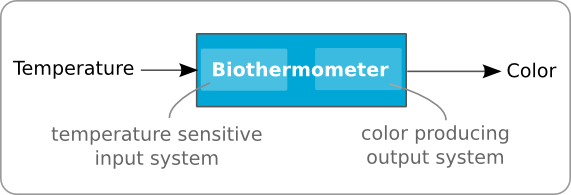Team:TUDelft
From 2008.igem.org
Bavandenberg (Talk | contribs) |
Bavandenberg (Talk | contribs) (→The Project - Engineering a biothermometer) |
||
| Line 12: | Line 12: | ||
The goal of our project is to construct temperature-sensing bacteria ''Escherichia coli'' that changes color at different temperatures. Such a thermometer can be applied e.g. as a temperature reporter system in large-scale fermentations, or as a temperature-inducible protein production system. The functionality of this thermometer relies on the post-transcriptional regulation of a temperature-sensitive RNA structure: it opens and enables the ribosome to bind, only when the temperature exceeds a certain threshold. | The goal of our project is to construct temperature-sensing bacteria ''Escherichia coli'' that changes color at different temperatures. Such a thermometer can be applied e.g. as a temperature reporter system in large-scale fermentations, or as a temperature-inducible protein production system. The functionality of this thermometer relies on the post-transcriptional regulation of a temperature-sensitive RNA structure: it opens and enables the ribosome to bind, only when the temperature exceeds a certain threshold. | ||
| - | [[Image:System.png|thumb|200px|right|Black box representation of the biothermometer, with temperature as input and color as output. The system can be split into two subsystems: A temperature sensitive input system and | + | [[Image:System.png|thumb|200px|right|Black box representation of the biothermometer, with temperature as input and color as output. The system can be split into two subsystems: A temperature sensitive input system and a color producing output system. The temperature sensitive input system works as a switch, switching on the output system at a certain temperature.]] |
We designed new artificial temperature sensitive RNA sequences, and developed protocols, using luciferase as a reporter, to test their functionality. For the colour output, we built upon the existing carotene biosynthesis pathway and converted all new elements to the BioBrick standard. Furthermore, we developed mathematical models describing both the temperature sensitive parts and the colour mevalonate pathway, and estimated parameters using the experimental data. The ethical issues in design and possible implementation of a commercial product are also addressed. | We designed new artificial temperature sensitive RNA sequences, and developed protocols, using luciferase as a reporter, to test their functionality. For the colour output, we built upon the existing carotene biosynthesis pathway and converted all new elements to the BioBrick standard. Furthermore, we developed mathematical models describing both the temperature sensitive parts and the colour mevalonate pathway, and estimated parameters using the experimental data. The ethical issues in design and possible implementation of a commercial product are also addressed. | ||
Revision as of 21:38, 29 October 2008
Welcome to the TU Delft 2008 iGEM wiki! On this page information about the project and its progress can be found. The climax of this project is the Jamboree in Boston, which will take place at the 8th and 9th of November in 2008.
The Team
This is the first year the TU Delft participates in the iGEM competition. We are six undergraduate students, four instructors and a lot of advisors, willing to help out and think with us when this is necessary. An overview of the people involved and our competences can be found on the team page.
The Project - Engineering a biothermometer
The goal of our project is to construct temperature-sensing bacteria Escherichia coli that changes color at different temperatures. Such a thermometer can be applied e.g. as a temperature reporter system in large-scale fermentations, or as a temperature-inducible protein production system. The functionality of this thermometer relies on the post-transcriptional regulation of a temperature-sensitive RNA structure: it opens and enables the ribosome to bind, only when the temperature exceeds a certain threshold.

We designed new artificial temperature sensitive RNA sequences, and developed protocols, using luciferase as a reporter, to test their functionality. For the colour output, we built upon the existing carotene biosynthesis pathway and converted all new elements to the BioBrick standard. Furthermore, we developed mathematical models describing both the temperature sensitive parts and the colour mevalonate pathway, and estimated parameters using the experimental data. The ethical issues in design and possible implementation of a commercial product are also addressed.
If you are interested in this project, we invite you to take a closer look at the website. For a more detailed summary of the project, please read the research proposal.
 "
"